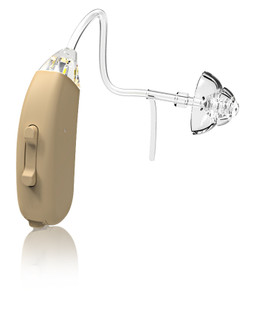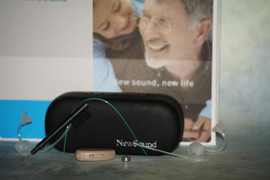Ear Congestion: What You Should Know
May 02, 2022
If you are experiencing muffled hearing, accompanied by a sensation of fullness, or pressure in your ear canal, then you may be suffering from a condition, commonly known as ear congestion.
A source of great discomfort, ear congestion mainly occurs when your Eustachian tube, a small canal running between your nose and your middle ear, becomes obstructed and is not able to function properly.
There Are a Number of Factors Which Can Cause This Condition–
Change in altitude-With a change in altitude, your Eustachian tubes may not have time to adapt to the change in pressure.
Sinusitis-Swelling of your sinus can cause you to feel pressure or fullness in your ears.
Ear infections- An ear infection like Otitis Media or Swimmer’s ear.
Cold / Allergies-The nasal inflammation and congestion that comes with a cold can also affect the Eustachian tubes, giving you clogged ears.
Excess Earwax-Buildup of too much earwax blocking the ear canal.
Congestion caused by the above conditions can be easily treated with home remedies and over the counter medicines.
However, ear congestion becomes a problem when it is caused by some underlying medical condition, which can lead to permanent hearing loss.
When Should You Consult Your Doctor?
Visit an audiologist to get a complete ear evaluation, if the congestion lasts more than 2 weeks and is accompanied by symptoms like hearing loss, fever, severe ear pain, discharge, ringing, balance issues, dizziness or headaches.
How to Treat Hearing Loss, Experienced During Congestion?
In the absence of a serious underlying medical condition, any loss of hearing will only be temporary and with adequate rest and proper medication, hearing will return to normal.
However, hearing damage can be permanent if congestion is caused by a serious condition, like a chronic ear infection.
In case of permanent hearing loss, the most common treatment to improve hearing is the use of a hearing aid.
A hearing aid is a battery-powered electronic device worn in or behind the ear, which helps people to hear distinctly.
How Do Hearing Aids Work?
All digital hearing devices improve hearing by carrying the sounds from the environment into your ear and by making them louder.
The microphones in the device pick up the different sounds and convert them to electric signals that can be understood by the processor.
A computer chip with an amplifier converts the incoming sound into digital code. It analyzes and adjusts the sound based on your hearing loss, listening needs and the level of the sounds around you.
The amplified signals are then converted back into sound waves and delivered to your ears through speakers.
Some important hearing aid parts are –
- Ear hook- The small portion that latches comfortably around the ear, helping to secure the device in its place.
- Ear bud -A small plastic bell-shaped piece at the end of the tube which is inserted in your ear.
- Hearing aid tubes- Used in transmitting sound from the microphone into your ear canal.
Today There Are Many Different Types of Hearing Aid Available Like-
How to Decide Which Hearing Aid Is Right for You?
When choosing a hearing aid, carefully explore all the available options. Your Audiologist can assess your hearing and help you in selecting a device, best suited to your lifestyle and needs.
Here are some features to consider-
- Wireless connectivity:
Bluetooth hearing aids can help communicate with different electronic devices, including your Smartphone, which you can use as a control for your device.
You can ensure a longer running time for your device by using the Power One batteries. The Power One batteries also have extra long tabs for easy handling and insertion of the cell into the hearing device.
The cost of hearing aids can vary widely from about $1,500 to a few thousand dollars. Professional fees, remote controls, hearing aid accessories and other hearing aid options may cost extra.
Some private insurance policies cover part or all of the cost of hearing aids; check your policy to be sure.
You can also avail of great discounted deals online on your preferred hearing aid.
So Start Your Journey to Better Hearing Today
In case of persisting ear congestion, immediately book an appointment with your audiologist.
Remember if your condition is symptomatic of permanent hearing damage, there is no need to panic.
With the help of the right hearing aid, you can easily improve your hearing ability and restore the quality of your life.










